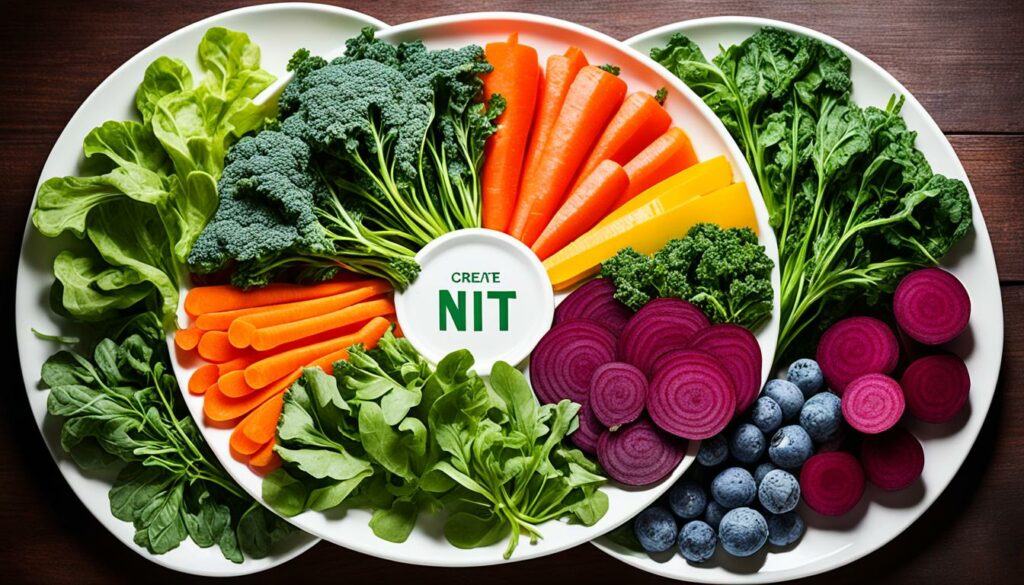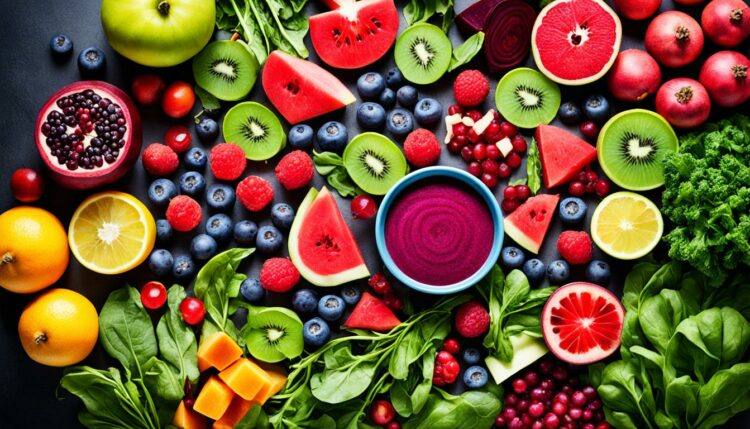Every year, the World Health Organization reports that 17.9 million people die from heart and blood vessel diseases. In the U.S., someone dies from these diseases every thirty-six seconds, as the CDC says. These diseases often happen when arteries get blocked, leading to heart disease or stroke.
This shows how important it is to keep our blood flow healthy. Nitric oxide helps control blood flow to our heart and brain. It’s a gas made in our bodies that does many important jobs.
There are many ways to increase nitric oxide without taking supplements. These methods can help keep your body healthy.
Key Takeaways
- Nitric oxide is essential for maintaining healthy blood flow and cardiovascular function
- Eating nitrate-rich vegetables like beets, spinach, and leafy greens can boost nitric oxide production
- Increasing antioxidant intake can support the body’s natural nitric oxide production
- Supplements like L-arginine and L-citrulline can help enhance nitric oxide levels
- Regular exercise is an effective way to naturally increase nitric oxide in the body
What is Nitric Oxide and Why is it Important?
Nitric oxide is a gas your body makes naturally. It’s key for your health in many ways. It helps widen your blood vessels, improving blood flow and circulation.
Having enough nitric oxide is vital for your health. It makes sure blood, nutrients, and oxygen reach all parts of your body. Not having enough is linked to heart disease, diabetes, and erectile dysfunction.
The Benefits of Nitric Oxide
- Helps maintain healthy blood pressure by relaxing and widening blood vessels, reducing strain on the heart.
- Enhances physical performance by delivering more oxygen and nutrients to the body’s muscles.
- May improve conditions related to blood flow, such as peripheral artery disease and angina.
- Can help reduce symptoms of erectile dysfunction by improving blood flow to the penis.
Nitric oxide is key for your cardiovascular health and blood flow. Knowing its benefits helps you support its production. This way, you can enjoy the many nitric oxide benefits for your health.
“Nitric oxide is a short-lived gas molecule made from nitrogen and oxygen that the body naturally produces.”
Eat Nitrate-Rich Vegetables
Eating nitrate-rich vegetables can boost your body’s natural nitric oxide production. Nitrates in these veggies turn into nitric oxide, which is great for your heart and exercise performance. Learn more about it here.
Some top nitrate-rich vegetables are:
- Beetroots
- Spinach
- Arugula
- Bok choy
- Broccoli
- Celery
- Swiss chard
- Kale
- Mustard greens
- Rhubarb
- Spirulina
Just one cup of these veggies a day can help your heart and blood vessels. For athletes, 400 mg of nitrate can boost endurance.
Raw green spinach keeps nitrate levels high, unlike cooked spinach. Eating a mix of fresh, nitrate-rich veggies boosts nitric oxide production.
“Nitrate experts like Norman Hord emphasize the importance of sourcing nitrates from vegetables due to their rich nutrient contents and health benefits.”
Mustard greens are packed with antioxidants and vitamins that help your heart. Adding these veggies to your meals can naturally increase your nitric oxide levels. This supports your overall health.
| Vegetable | Nitrate Content | Health Benefits |
|---|---|---|
| Beetroots | High | Improved exercise performance, reduced blood pressure |
| Spinach | High | Increased nitric oxide levels, better cardiovascular health |
| Arugula | High | Enhanced cognitive function, anti-inflammatory properties |

Increase Antioxidant Intake
Nitric oxide is a gas molecule made in our bodies. It’s key for many body functions. But, it doesn’t last long in the blood. Eating antioxidants can help keep it stable and stop it from breaking down too fast.
Antioxidants fight off free radicals, which can shorten nitric oxide’s life. You can find antioxidants in many plant-based foods like fruits, veggies, nuts, seeds, and grains. Important antioxidants include vitamin C, vitamin E, polyphenols, and glutathione.
Studies show that eating foods with nitric oxide helpers and antioxidants keeps nitric oxide levels up. For instance, some studies found that eating nitrate-rich veggies can lower blood pressure as much as some meds do.
| Antioxidant | Food Sources | Benefits for Nitric Oxide |
|---|---|---|
| Vitamin C | Citrus fruits, peppers, broccoli, strawberries | Protects nitric oxide from oxidative damage |
| Vitamin E | Nuts, seeds, plant oils, leafy greens | Enhances nitric oxide production and stability |
| Polyphenols | Berries, green tea, dark chocolate, red wine | Promotes nitric oxide release and activity |
| Glutathione | Avocado, asparagus, broccoli, walnuts | Protects nitric oxide from degradation |
Eating foods high in antioxidants can help keep nitric oxide stable and boost its production. This is good for your heart, blood flow, and overall health.
How to increase nitric oxide naturally
Keeping your nitric oxide levels healthy is key for your overall health. As you get older, your body makes less nitric oxide. But, there are ways to naturally increase your levels. This helps your heart and metabolism stay healthy.
Supplements for Nitric Oxide Production
Some supplements can help boost your nitric oxide production. L-arginine and L-citrulline are two examples. L-arginine makes nitric oxide directly. L-citrulline turns back into L-arginine, helping to increase nitric oxide levels.
- L-arginine can improve blood flow, especially for people with high blood pressure.
- L-citrulline increases blood flow, helps with exercise, and lowers blood pressure.
Adding these supplements to your daily routine is an easy way to support your nitric oxide levels.

“Nitric oxide is a crucial signaling molecule in the body, with a wide range of physiological functions. Maintaining optimal nitric oxide levels is essential for cardiovascular, metabolic, and overall health.”
By eating well, exercising regularly, and using supplements, you can boost your nitric oxide levels. This is a great way to support your health for the long term.
Limit Mouthwash Use
Mouthwash can help keep your mouth clean, but use it carefully. It can kill good bacteria that turn nitrates into nitric oxide. Nitric oxide is important for many body functions.
This gas molecule helps control blood pressure, improve blood flow, and boost performance. But, mouthwash can upset the balance of bacteria in your mouth. This can lower nitric oxide levels, which might increase the risk of diabetes and heart disease.
Research shows mouthwash can cut nitric oxide levels for up to 12 hours. This could even raise your blood pressure. To keep nitric oxide levels up, use mouthwash less and stick to brushing, flossing, and eating foods high in nitrates.
The Impact of Mouthwash on Oral Bacteria
The bacteria in your mouth are key to making nitrates into nitric oxide. But, mouthwash’s antibacterial effects can harm this process. This is bad news since nitric oxide is vital for many health benefits, like controlling blood pressure and boosting performance.
- Mouthwash can kill good oral bacteria that make nitric oxide.
- Less nitric oxide can lead to higher blood pressure and health problems.
- To keep nitric oxide levels right, use mouthwash less and focus on other ways to keep your mouth clean.
Be careful with mouthwash and focus on keeping a healthy balance of bacteria in your mouth. This helps keep your nitric oxide levels up, supporting your overall health and wellbeing.
Exercise Regularly
Exercise boosts your body’s nitric oxide production. Nitric oxide is key for heart health. It makes blood vessels wider, improving blood flow and oxygen to your body.
Exercise helps your endothelial function too. Endothelium lines your blood vessels and makes nitric oxide. Better endothelial function means more nitric oxide and healthier blood vessels.
Studies show that different exercises increase nitric oxide levels. Cardio, strength training, and high-intensity workouts help a lot. In fact, 72% of adults can boost their nitric oxide through exercise.
Exercise also has more health perks. It can lower blood pressure, improve how well you exercise, and make your brain work better. It also strengthens your immune system.
So, add regular exercise to your life to support nitric oxide and heart health. Your heart and overall health will benefit greatly.
“Exercise keeps your endothelial cells and blood vessels healthy by increasing your body’s natural ability to produce nitric oxide.”
Conclusion
Nitric oxide is key for good health. It helps blood vessels relax, making them bigger. This lets blood, nutrients, and oxygen reach every part of the body easily. But, if you don’t have enough nitric oxide, your health can suffer.
Eating lots of nitrate-rich veggies and antioxidants helps. Taking supplements like L-arginine or L-citrulline also works. And, try to use less mouthwash and exercise daily.
To really boost nitric oxide, eat more nitrate-rich veggies and exercise for at least 30 minutes a day. These steps are easy to follow and can greatly improve your health.
By doing these things, you can summary of how to increase nitric oxide and enjoy many benefits. You’ll see better heart health, improved blood flow, and more energy. Taking charge of your nitric oxide levels is a great way to live a healthier life.
FAQ
What is nitric oxide and why is it important?
Nitric oxide is a compound made of one nitrogen and one oxygen atom. It’s key for the body’s health. It helps widen blood vessels, improving blood flow.
This is crucial for delivering nutrients and oxygen to all body parts. It’s vital for good health.
What foods are high in nitrates?
Foods rich in nitrates include celery, cress, chervil, lettuce, beetroot, spinach, and arugula. Eating these turns nitrates into nitric oxide. This boosts heart health and exercise performance.
How do antioxidants help with nitric oxide production?
Nitric oxide doesn’t last long in the blood. Antioxidants like vitamin C, vitamin E, polyphenols, and glutathione help. They fight off free radicals that shorten nitric oxide’s life.
This keeps nitric oxide levels up in the body.
What supplements can help increase nitric oxide production?
Supplements like L-arginine and L-citrulline boost nitric oxide. L-arginine makes nitric oxide directly. L-citrulline turns back into L-arginine, helping make more nitric oxide.
How does mouthwash affect nitric oxide production?
Mouthwash kills good mouth bacteria that turn nitrate into nitric oxide. This can lower nitric oxide levels and raise blood pressure. Use mouthwash carefully to keep nitric oxide production up.
How does exercise affect nitric oxide production?
Exercise helps improve blood vessel function. This includes the cells that make nitric oxide. Not enough nitric oxide can lead to health problems.
Regular exercise boosts nitric oxide production. It also stops free radicals from breaking it down.




